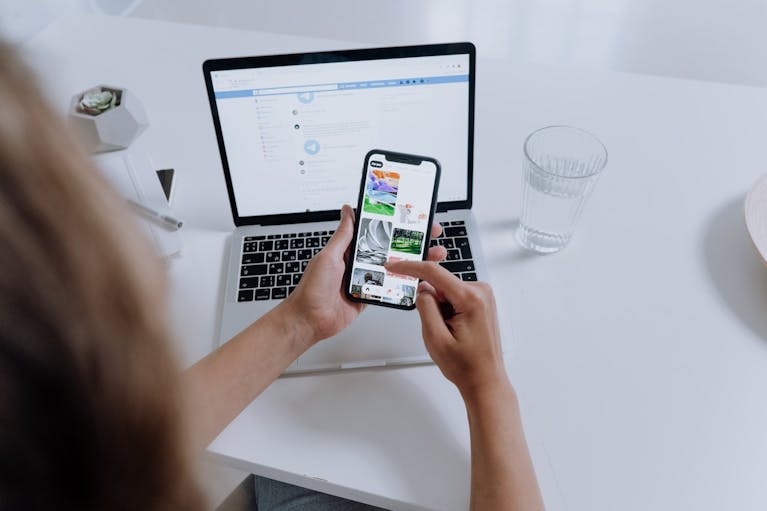The journey of creating a mobile app is exciting. The first question that arises in the mind of mobile app developers and stakeholders is, “How long will it take to develop a mobile application?” The answer to this question is longer than expected, but you do not have to fear. Because each application is unique and needs proper planning of the development process, research, and testing stages. That is why mobile apps are created with a development timeframe, just like your dream home. It needs proper time, money, specifications, and effort. Similarly, an application also needs a development lifecycle, and each life cycle needs time to process successfully.
Estimate for different types of application
An application can be developed between three and nine months, but it depends on structure and function complications that make this process long or short. Therefore, the duration of an app depends on its type. A developer must focus on the type of mobile app to develop the mobile application. Below are three categories of mobile applications and their estimated timeframes.
Basic application
Basic mobile applications are those apps that can be developed quickly because of their simple functions and structure. These applications are developed with fewer features, unique UI, and minimal functions, for example, unit converters, calendar apps, calculator apps, etc. The estimate for developing basic mobile applications is 1 to 3 months. Testing and smooth running of user experience lies in this timeline.
Moderate applications
The applications have more functions, and a moderately complex UI is called a moderate level of application. For example, weather apps, commerce apps, and more are moderate-level apps. These mobile applications need basic API but have a moderate user experience. In addition, this type of app is developed around about 3 to 6 months.
Complex application
Complex mobile applications are developed in 6 to 1 year because of their complex features, structure, and UX/UI design. As on-demand apps, productivity apps, social media apps, and more are complex-level applications. These types of mobile applications require multiple functions, a perfect architecture environment, and a user interface.
Advanced level applications
Advanced-level mobile applications are developed within 1 to 2 years because of their advanced technology and innovations. Advanced-level mobile applications need advanced coding, testing, planning, and optimization. Moreover, this type of mobile application provides high performance and UE.
Stages of mobile app development according to a timeframe
Mobile app development did not process without complete phases that needed different timespans. Every step of mobile application development requires proper time to process successfully. As mentioned above, applications with various features and functions require different timeframes. Here are the mobile app development stages:

Stages of mobile app development according to a timeframe
Stage 1: Ideas (1 or 2 weeks)
The first stage of mobile app development is to make ideas and research. Everyone has their mindset, and it is not simple for them to like your idea. Therefore, you have to develop the best vision because of your research. It is the starting point of app development to find a great idea that attracts the attention of everyone. At this stage, the mobile app developer needs to know the target audience, competitors, and technology and conduct research. This stage takes 1 or 2 weeks to complete. For instance, the target audience of social media applications is all types of people.
Stage 2: Planning (2 or 4 weeks).
After idea formation, planning is the second stage of mobile app development. In this stage, the mobile app developer plans the development process, like deciding on the application configuration. You have decided what features would be added to the application, such as login options, a search bar, profile building, etc. Moreover, you need to make a decision on what type of application you want for your business, such as cross-platform, native, hybrid, web-based, mobile-based, etc. All these features and functions are significant, which make the users more convenient on the application. Moreover, the application size is planned at this stage, and it takes 2 or 4 weeks to process.
Stage 3: Design ( 1 to 3 months)
At this stage, the UX/UI designer builds the design for the app user interface and user experience. Every app is designed because of app complexity to get the best result. Designers work at this stage, designing the user interface to give the proper look to the app. However, before that, designers made complete wireframes, prototypes, and mockups using the UI tool kit. This tool kit is used to create proper features to give the feel of the application. However, the designer uses Figma, XD, or sketch tools to create all those designs. The designer makes the complete blueprint of the mobile application and then hands it over to the mobile app developer for app development. This stage takes 1 to 3 months to process.
Stage 4: Development ( 6 to 12 months)
In the development stage, the application’s implementation and coding occur. It is a time-consuming and critical stage where three key elements are used to build an app. A user interface, backend, and front end are these elements. If your priority is these three elements, then your app will be efficient and meet the needs of the user. This stage usually takes 6 to 12 months or more.
Backend development
At the backend development stage, mobile app developers used to plan for security and storing data. The purpose of backend development is the same as the server. The most common servers used for backend alternates are custom servers, MBAaS, and cloud servers. Moreover, the backend gives components such as data storage, server-side logic, versioning, data integration, and user management.
Frontend development
What the user can see is the front end of the application. It can be structure, design, app behavior, or content that users see. It is utilized to give the actual mockup to the app, where the user can write feedback. These frameworks are used with the help of programming languages such as JavaScript, CSS, Swift, and HTML.
Stage 5: Testing (3 to 5 weeks)
After completion of the part of development. The testing stage starts when the mobile app developer tests the app to check whether it works smoothly. The developer conducts many app tests before launching into the market. Because if any issue or bug is found in the application, it can be fixed beforehand. There are more ways to check the performance and functioning of an application. For instance, quality assurance tests are conducted to check the accuracy of the application and whether it works properly. Alpha and Beta testing is conducted to make the application error-free. When no error or bug is found in the mobile application, it launches on the market. This stage takes 3 to 5 weeks to process.
A complete development process for mobile app development
As mentioned above, you read the timeframe for mobile application development. If you want to develop a mobile application, read this article. It will guide you on How to build a complete mobile application.
How Long Does It Take to Develop Different Types of Mobile Apps?
The development time can vary significantly depending on factors like app complexity, features, and the development team's expertise, but we will try to give an approximate idea of the developmental timelines for various types of apps with a 5-member team comprising of:
- 2 developers,
- 1 designer,
- 1 project manager, and
- 1 QA tester.
If you want to know the cost of development for the following apps, do check out our blog on Cost to develop a mobile app- a complete guide.
1. Messaging Mobile App (e.g., WhatsApp)
Description: A real-time messaging app allowing users to send text, images, videos, and voice messages. It includes features like group chats, multimedia sharing, and end-to-end encryption.
Development Timeline:
- Planning (2-4 weeks): Define features, functionalities, and security measures.
- Design (1-3 months): Create wireframes, prototypes, and UI/UX design.
- Development (6-12 months): Implement front end, back end, and security features.
- Testing (3-5 weeks): Conduct quality assurance and user testing.
2. Ride Sharing and Booking App (e.g., Uber)
Description: An app facilitating ride-sharing and booking services, allowing users to request rides, track drivers, and make secure payments.
Development Timeline:
- Planning (2-4 weeks): Define features, map integrations, and payment systems.
- Design (1-3 months): Create wireframes, user interfaces, and design app flow.
- Development (6-12 months): Implement geolocation, payment gateways, and user accounts.
- Testing (3-5 weeks): Ensure smooth navigation, payment processing, and driver tracking.
3. AI Chatbot for Customer Support (e.g., Chatbot)
Description: An artificial intelligence-powered chatbot designed to assist users with common queries and provide customer support.
Development Timeline:
- Planning (2-4 weeks): Define the scope, integration channels, and AI capabilities.
- Design (1-3 months): Create conversation flow, UI for integration, and chatbot behavior.
- Development (6-12 months): Implement natural language processing and integration points.
- Testing (3-5 weeks): Ensure accurate responses, effective user interactions, and integration reliability.
4. Social Media Platform (e.g., Instagram)
Description: A social media app allowing users to share photos and videos, follow others, and engage with content through likes and comments.
Development Timeline:
- Planning (2-4 weeks): Define features, content-sharing mechanisms, and user interactions.
- Design (1-3 months): Create visually appealing UI, explore feed algorithms, and design user profiles.
- Development (6-12 months): Implement media uploading, user authentication, and social features.
- Testing (3-5 weeks): Test content delivery, user interactions, and app performance.
5. E-commerce Mobile App (e.g., Amazon)
Description: An app allowing users to browse products, make purchases, track orders, and manage their accounts.
Development Timeline:
- Planning (2-4 weeks): Define product categories, payment options, and account management.
- Design (1-3 months): Create intuitive UI, design product listings, and optimize the shopping cart.
- Development (6-12 months): Implement secure payment gateways, order tracking, and user accounts.
- Testing (3-5 weeks): Ensure seamless transactions, order processing, and user account security.
It is important to note that these timelines are estimates, and the actual development time can vary based on project specifics and unforeseen challenges. Collaborative planning, continuous communication, and a dedicated team contribute to a successful mobile app development journey.
| **Type of App** | **Description** | **Planning** | **Design** | **Development** | **Testing** | **Total Time** |
| **Messaging Mobile App** | Real-time messaging app with text, images, videos, and voice messages. | 2-4 weeks | 1-3 months | 6-12 months | 3-5 weeks | 12-24 months |
| **Ride Sharing App** | Facilitates ride-sharing and booking services with geolocation, payments, and tracking. | 2-4 weeks | 1-3 months | 6-12 months | 3-5 weeks | 12-24 months |
| **AI Chatbot for Customer Support** | AI-powered chatbot assisting users with queries and providing customer support. | 2-4 weeks | 1-3 months | 6-12 months | 3-5 weeks | 12-24 months |
| **Social Media Platform** | Allows users to share photos and videos, follow others, and engage with content. | 2-4 weeks | 1-3 months | 6-12 months | 3-5 weeks | 12-24 months |
| **E-commerce Mobile App** | Enables browsing, purchases, order tracking, and account management. | 2-4 weeks | 1-3 months | 6-12 months | 3-5 weeks | 12-24 months |
Conclusion
In other words, it is challenging to estimate the exact time for mobile app development because it depends on many factors like features, platforms, and complexity. However, the average estimate is that mobile app developers need 9 to 12 months to develop the application. For mobile app success, it needs proper ideas, planning, design, development, and testing stages. It is necessary to create a well-functional application; you need to invest time in it. Keep in mind that mobile app development is not a race but a journey where you give life to your idea and take measurements for its success.



